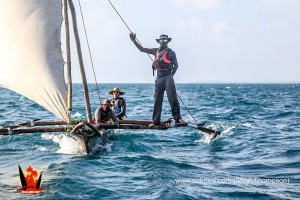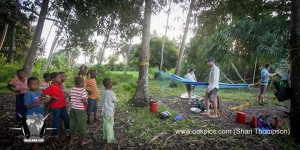18 February 2016
The Ngalawa Cup (Part Two)
A sailing adventure in the Indian Ocean.
by Alexander Nimmo
 The training is over; the teams and the boats are ready; the race is on…
The training is over; the teams and the boats are ready; the race is on…
The first day we aimed to sail to Stone Town (also known as Mji Mkongwe), the main town on Zanzibar. The wind built over the course of the day until we were running with it directly behind us and surfing the swell towards our destination. As with all good things, it came to an end as we spectacularly capsized after surfing a particularly large wave. The waters around East Africa are incredibly warm, so it really wasn’t uncomfortable getting the boat back upright and swimming around sorting stuff out. We had tied all the gear onto the boat so we were able to focus on getting it bailed out (yet again). The organisers had given us inflatable tubes to be used to support the boat after such an event, and these, placed under the outriggers, gave enough lift to just keep the rails out of the water and allow bailing. Once we were upright we were able to get sailing again – this time feeling immensely proud of ourselves for having overcome such a setback on our own.
That evening we enjoyed a great curry and some drinks in Stone Town, and planned to set off the following day around nine. So much for well-laid plans. The next morning, as we were walking the boat along the beach to get it towards a more sheltered spot for launching, another team capsized just ahead of us. They rapidly drifted into shore, and as we tried to stop their boat the swell pushed ours onto the beach as well. The two boats were taking a pounding. We needed to unload them quickly. Despite our best efforts both boats were quite badly damaged before we could push them back out. They needed repair work which we had neither the experience nor the materials to deal with. Local help was urgently required! Two guys sitting smoking on the beach looked promising. The large bag of tools on the ground between them seemed to indicate some form of practical abilities. For a small payment they skilfully re-caulked the hulls and re-lashed the outriggers. We eventually left at 15.30.
Unable to make that evening’s official destination before dark, we landed on an amazing uninhabited desert island where a lone caretaker was guarding a collection of resort beach shelters. A great deal more hospitable than the residents of the fishing village we were to encounter later in the trip, he cooked ‘Ugali’ (a local dish made with corn flour and some sort of meat, which may have been goat) for the four of us, over a carefully-constructed camp fire. With our hammocks strung from trees, and looking up at the stars, we drifted off to sleep to the sound of the ocean.
 The next day we made an early start, but problems with our GPS tracker meant that we were delayed by a few hours as we had to get a spare from the rescue boat. We had another 30-mile journey ahead of us to the mandatory checkpoint, and by the time we got there the tide was so low that breaking waves were crashing over the reef. We couldn’t see the anchorage, nor the other boats, and were a bit concerned we were in the wrong place. We were; not by much, but enough to cause us problems. 200m short of the channel we managed to surf the first wave in, but the second and third waves swamped us and the boat hit the reef. It turned side on, and as skipper I made the decision that we needed to get out of the boat and into the lagoon behind the reef. We took out all our gear and as Tom and I swam toward the beach about 600m away, Rory spotted the approaching rescue boat. They managed to get our boat off the reef and tow it to the shore, but not before we had all sustained some pretty unpleasant cuts from the coral, which would cause us more than a little grief for the rest of the race.
The next day we made an early start, but problems with our GPS tracker meant that we were delayed by a few hours as we had to get a spare from the rescue boat. We had another 30-mile journey ahead of us to the mandatory checkpoint, and by the time we got there the tide was so low that breaking waves were crashing over the reef. We couldn’t see the anchorage, nor the other boats, and were a bit concerned we were in the wrong place. We were; not by much, but enough to cause us problems. 200m short of the channel we managed to surf the first wave in, but the second and third waves swamped us and the boat hit the reef. It turned side on, and as skipper I made the decision that we needed to get out of the boat and into the lagoon behind the reef. We took out all our gear and as Tom and I swam toward the beach about 600m away, Rory spotted the approaching rescue boat. They managed to get our boat off the reef and tow it to the shore, but not before we had all sustained some pretty unpleasant cuts from the coral, which would cause us more than a little grief for the rest of the race.
The simplicity of the boat was its salvation. It takes a lot to damage a tree trunk, so with little extra work our boat was ready by the evening. The checkpoint was a good opportunity to catch up with other teams and have a few drinks. Our feelings of incompetence around hitting the reef were somewhat assuaged when it emerged, on talking to the other teams, that only one had actually managed to make it through the channel and into the anchorage without any issues.
The following day we set off early. But within an hour of leaving, the lashings holding the perpendicular outrigger came loose. Tom bravely stood with one foot pressing the outrigger down and the other on the boat as we nursed it back into the anchorage. Yet another challenge overcome! We had got back to the beach with a broken boat and nothing had gone wrong. From that point onwards we felt we could deal with anything else this adventure threw at us.
Was Alexander’s confidence misplaced? Find out next week in the third and final part of The Ngalawa Cup as they race towards the finish…
Please click here if you would like a weekly email on publication of the Shaw Sheet

